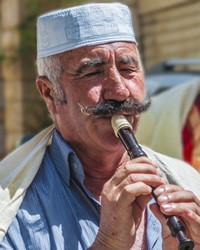Berber, Kabyle in Belgium

Photo Source:
Alioueche Mokhtar - Wikimedia
Creative Commons
|
Send Joshua Project a map of this people group.
|
| People Name: | Berber, Kabyle |
| Country: | Belgium |
| 10/40 Window: | No |
| Population: | 56,000 |
| World Population: | 7,564,000 |
| Primary Language: | Kabyle |
| Primary Religion: | Islam |
| Christian Adherents: | 2.00 % |
| Evangelicals: | 1.50 % |
| Scripture: | Complete Bible |
| Ministry Resources: | Yes |
| Jesus Film: | Yes |
| Audio Recordings: | Yes |
| People Cluster: | Berber-Kabyle |
| Affinity Bloc: | Arab World |
| Progress Level: |
|
Introduction / History
The Kabyle are a North African Berber tribe located primarily in Morocco, Tunisia, western Libya, and the coastal mountain regions of northern Algeria. The Africans call this entire region of North Africa Maghrib. During the third century, the Romans named the people of the Maghrib Berber, which means "barbarian." The Kabyle live in the rugged, well-watered al-Quabail Mountains. These inaccessible peaks have long been a refuge for the Berbers against the Romans, Vandals, Byzantines, and Arabs. Emigration is becoming more common among the Berbers, and several million now live in Europe. Thousands from the Kabyle group have migrated to Belgium, the "crossroads of Europe." Some arrived after World War II when there was a labor shortage in Belgium. Still others went as merchants since Belgium is an important trading partner of North Africa. Belgium is located near England, France and Germany providing trade opportunities and prosperity for these North Africans.
What Are Their Lives Like?
For unemployed Kabyle in modern times, immigration to Europe means employment opportunities, and decades of immigration have left a large community in Belgium. Since then, the number of Kabyle Berbers in Belgium have fluctuated depending on the needs for cheap labor and the economic/political situations in North Africa. One can find Kabyle Berbers running family grocery stores or driving cabs in Belgium's urban centers. Those Kabyle who are recognized as refugees in Belgium have the same rights as nationals, except the right to vote. They can request aid from the community, but recently Belgium has refused to accept newly arriving refugees. African refugees stand at the bottom of the economic scale and are subject to racial prejudice. Preserving the family is important to the Kabyle. Even when a family member is forced to migrate to other countries, family ties remain strong. Family bonds are also strengthened by their marriage customs and inheritance rights. Often, an entire family lives in one small room, sharing everything. The father is the head of the family, and ancestry is traced through the males. According to tradition, a local assembly composed of the heads of all families governs the villages.Like other Muslim communities in secularized Europe, the Kabyle Berbers often look inward to maintain their culture. Islam is usually a big part of this equation.
What Are Their Beliefs?
Although the Kabyle are almost completely Muslim, they still retain many of their traditional beliefs, such as saint worship. They usually celebrate the Muslim holidays, visiting friends and neighbors during these festive times. Weddings are lengthy celebrations that often last several days. In secularized Belgium, these Muslims either become more secular, or they become more entrenched in the Islamic religious system.
What Are Their Needs?
Kabyle Berbers need the chance to put their identity in Jesus Christ and enjoy his blessings in this life and in the life to come. Someone needs to go to them with the life-changing gospel.
Prayer Points
Pray for a spiritual hunger among Kabyle Berbers that will lead them to the cross and the empty grave. Pray for Kabyle Berbers in Belgium to put their faith and hope in Christ, paving the way for a Disciple Making Movement. Pray for workers to go to Kabyle leaders and find persons of people who will welcome them into their communities with the gospel of peace.